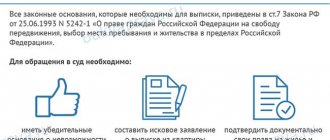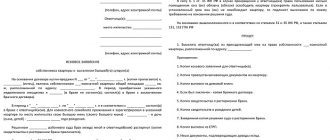Article current as of: May 2021
Legally, the concept of “registration” has not existed in Russia since 1993; it was replaced by the concept of “registration”. When registering at the place of residence or place of stay, many citizens ask themselves: does registration affect property rights? Owners of residential premises are wary of requests to register residents, fearing that they may lose part of the apartment. In order for such questions not to arise, it is important to know what rights a registration in a private and municipal apartment gives and who can dispose of real estate where there are registered residents. We will look at the answers to these questions in detail in this article.
Registration with ownership rights, what is it?
In Russian legislation, such a concept as “registration with ownership rights” no longer exists. Previously, such registration meant that a citizen registered at a certain address had the right to receive a share of the living space.
The second important condition is that the municipal apartment where the citizen who wishes to take part in privatization is registered was not privatized by previous residents.
In cases where a minor citizen is registered in an apartment, in order to discharge him, he will need to be registered at his new place of residence with the provision of a share of the living space. This rule is provided for by current legislation in order to protect the rights of the small citizen.
In cases of divorce, when a child remains with a mother who does not have her own home, the court may oblige the father to provide his ex-wife and child with new living quarters. A man can rent housing for his ex-wife and pay the rent, while keeping the child registered in his apartment, he can exchange or buy an apartment.
The ex-wife loses the right to part of the spouse's property, but at the same time is the legal representative of a minor citizen, therefore she has the right to demand the provision of living quarters. Information on how to discharge your ex-wife from a privatized apartment is right here.
In some cases, registration with ownership rights may be considered registration in a service apartment owned by a legal entity (organization or enterprise). The possibility of transferring ownership of the living space to a registered tenant is discussed in advance and fixed in the employment contract.
What does registration give?
Registration of a person at his place of residence within the Russian Federation is very significant. Government authorities consider failure to register as an offense and impose fines on violators. Moreover, without registration, a person is limited in his rights and opportunities, from medical care to the execution of any documents.
What opportunities can registration provide:
- Joining a queue to enroll your child in a kindergarten in a specific area;
- Choosing a school institution for a child based on territoriality;
- Receiving social benefits and allowances;
- Receiving free medical care in district clinics, as well as inpatient treatment in district hospitals;
- Confirmation of your location for employers if you need to get a job;
- Obtaining an identification code, driver's license, medical insurance.
In other words, without registration it will be quite difficult to fully coexist in modern society, especially in a large populated area. It is important to note that a citizen can register in a privatized apartment only with the written permission of the property owner. This will invariably affect the quality of life of the apartment owner and utility bills, but whatever the concerns, no one except the owner and co-owners can lay claim to part of the property.
Permanent registration with the right to living space, what is it?
The concept of “permanent registration with the right to living space” should be understood as registration of the owner of residential premises at the place of residence in an apartment that belongs to him.
Only a citizen who is the owner of a residential premises can dispose of the square footage belonging to him at his own discretion:
- Register in the apartment with your family or register strangers there;
- Rent out an apartment;
- Demand that residents leave their occupied living space;
- Sell an apartment;
- Exchange real estate;
- Leave your apartment as an inheritance or donate it.
If there are grounds, the owner of a residential premises can forcibly remove residents from his apartment. Read here how an owner can remove a person from an apartment without his or her consent.
The owner of a residential premises is not responsible for the residents assigned to his apartment, except in cases where:
- his close relatives;
- minor children;
- persons who refused to participate in privatization in favor of the owner while retaining the right to reside.
If the owner of an apartment has registered a married couple, he must remember that residents will be able to register their minor child independently without the consent of the owner of the living space. And writing it out in the future may be problematic.
Is registration a right to property?
Registration at the place of residence or stay gives the citizen a number of social guarantees and benefits, but does not give the right to property. Only its owner has the right of ownership of real estate.
Citizens registered at a specific address can:
- To be served in district clinics and hospitals;
- Register for unemployment;
- Choose a school for your children;
- Put children on a waiting list for kindergarten;
- Receive subsidies, benefits and benefits;
- Confirm your location to your employer and banks;
- Form an individual entrepreneur;
- Receive a driver's license, compulsory medical insurance policy, SNILS and TIN.
In addition, registration in an apartment gives a citizen the opportunity to live at the specified address and use communications and utilities. All rights registered in a privatized apartment can be found out in a separate article.
When does registration in a municipal apartment give you the opportunity to live in the apartment for life? Watch the video:
Regardless of how many people are registered in the apartment, only the owner can dispose of it. The presence of a registration mark at the place of residence guarantees the possibility of living at the specified address and the fact that they will not be able to evict a citizen without good reason without his consent. A registration mark at the place of residence guarantees a place of residence for the period specified in the relevant document or until a change in circumstances.
This is important to know: Share in the right of common ownership of common property
Is it possible to make a temporary registration if the apartment has a mortgage? Read this article of ours.
For additional information on this issue, please refer to the “Registration” section here.
Free legal support by phone:
Attention! Due to recent changes in legislation, the legal information in this article may be out of date!
FAQ
Can a grandson registered with his grandmother claim a share in her apartment?
A grandson, even registered by his grandmother in her own apartment, has the right to receive something in it only at the request of the grandmother herself, in no other way. For example, if she wants to donate a share.
If she doesn’t want the apartment in her sole ownership, then the relative will not receive anything. But if the elderly woman’s housing is municipal, any official tenant can take part in privatization and receive the rights of a co-owner of square meters.
It will be possible to discharge a grandson from a private living space, at least through the court, but from a municipal one - definitely not, guardianship will not allow it.
The ex-wife refuses to be discharged and says that guardianship will not allow her son to be discharged. Is it so?
If your son does not have a share in your living space, then you do not need the consent of the board of trustees to remove him from the register. Send a written warning (preferably twice) to your ex-wife at the address of your apartment and demand to leave, referring to Art. 31 LCD. If this proves unsuccessful, take legal action. Attach to the application the documents confirming the title to the home, a certificate of termination of the marriage union and a decree on alimony, if any. This is enough for the court to order the woman and boy to leave your home.
A distant relative who came to work asks to be registered without the right to living space. How to do this?
It is important to understand what exactly the relative means by the phrase “registration without the right to living space.” Having registered, she will in any case be able to live at the apartment address along with you (Article 30 of the Housing Code). And she won’t have any proprietary rights to your property anyway – with or without registration.
Don't agree without discussing this point. Maybe the woman meant that she would live in another place, for example, in a hostel or in a hotel? Then why should she register somewhere else? Let him register there, it’s free.
If you don't want this kind of housing, refuse. Or invite the lady to register at her place of stay. Indicate in the application the period for which you agree to let it go. When it expires, the right to reside in your territory will automatically cease.
Eviction of a registered person, not the owner, from an apartment
- the resident has debts on utility bills;
- violation of the country's housing legislation;
- recognition of the apartment as unsafe;
- plans for the reconstruction of housing or its repair, which do not allow citizens to stay on the territory of the apartment during work.
Today we have to find out how a registered person is evicted from an apartment. Not the owner - this is important. Indeed, when solving such housing problems, property rights play an important role. What can citizens registered in housing claim? When can they be evicted and on what grounds?
Does registration give you the right to own a home?
What rights does a person registered in an apartment but not the owner have? Does registration give the right to own a home? What rights does registration in an apartment give? All these questions have arisen more than once among persons who are registered, but at the same time are not recognized as full owners of housing. Registration with ownership rights is, of course, possible. However, there will be no connection between the ownership of housing and direct presence in it due to registration. Registration and rights are not related concepts, but this, in turn, still gives rise to some rights of the registered person to the apartment where he lives.
What rights does someone registered in an apartment have? Do they even exist? And is this person a full participant in such a relationship? Yes and no. Only those persons who have his permission live in the owner’s apartment. That is, in any case, everything depends on the person who is the full owner of the property, even if the registration procedure for some reason is not controlled by him, which is unlikely. And speaking about the capabilities of people receiving registration, it should be noted that they will be determined by only two options.
Rights of citizens with registration in a non-privatized apartment
The full list of obligations and rights of citizens who rent housing from the state is regulated by the housing legislation of the Russian Federation. Legally, the tenant is the subject who is fully responsible for the maintenance and actual condition of the apartment. Such a person, registered in a given living space, has the right to register other citizens there. However, he can obtain state registration only if the established standards of living space per person are met.
The tenant and every person registered in a social apartment have absolutely the same right to operate the premises and live in it. The same right also applies to the opportunity to receive a share of the property when an apartment is privatized.
It is important to consider that children under fourteen years of age must register with one of their parents. If this is social rented housing, which is later privatized, then registered children will have a share of the property that no one can take away from them. In this case, the opinion, consent or permission of other residents does not matter.
What rights does temporary or permanent residence permit (registration) in an apartment provide?
Another common situation: a minor has the right to register at the place of residence of one of the parents. It is being implemented without additional permission from the residents living on it. When carrying out the privatization procedure, the child is provided with a mandatory share of property (Article 2 of Law No. 1541).
A person has the right not to live at the address indicated in the passport. However, his permanent registration will not change. But the state obliges a citizen to report his whereabouts if he is absent for more than 90 days. This registration is called temporary. There are no marks in the passport; the address of the place of stay is indicated on a separate insert. It is only valid upon presentation of an ID.
Do people registered in it have the right to an apartment?
Of course, your daughter-in-law does not acquire ownership rights. T.N. “registration” (correctly - registration at the place of residence) is just an administrative and legal action that does not give rise to property rights. Prejudices regarding “registration” and the consequences arising from it are associated with the ancient Soviet system, when all housing was “sovereign”, and registration meant moving a citizen into an apartment as a family member.
We recommend reading: Who is paid funeral benefits?
What right does registration in an apartment give a citizen?
The procedure according to which registration is carried out is determined by the Law of the Russian Federation of June 1993. According to this law, a person has complete freedom of movement throughout the territory of Russia and his duties include informing the state about his place of stay.
What rights does registration (permanent) of a citizen in municipal housing give? A person living in such an apartment receives the same rights that permanent registration gives if the housing is privatized. Ownership of such housing is exclusively vested in the municipality, so residents cannot dispose of the apartment. Their right is to privatize housing (with the consent of the municipality), after which everyone registered becomes the owner of a share in the apartment.
Registration required
The question of why temporary registration or registration is needed is answered by the legislation of the Russian Federation. Government Decree No. 713 obliges the population to register at their place of residence. Only in this case, from the point of view of the state, is it possible to fully realize the rights and responsibilities of a citizen. At the same time, according to the Constitution of the Russian Federation, he has the right to choose a place to live at his own discretion.
Does registration give you the right to own a home?
3. In the cases and in the manner provided for by this Code, a person may acquire ownership rights to property that does not have an owner, to property whose owner is unknown, or to property that the owner has abandoned or to which he has lost the right of ownership on other grounds, provided by law.
1. The owner has the rights to own, use and dispose of his property.2. The owner has the right, at his own discretion, to take any actions in relation to his property that do not contradict the law and other legal acts and do not violate the rights and legally protected interests of other persons, including alienating his property into the ownership of other persons, transferring to them, while remaining the owner, the rights possession, use and disposal of property, pledge property and encumber it in other ways, dispose of it in any other way.
What rights does a person registered in the house, but not the owner, have?
Taking into account the federal legislation regulating the fundamental rights and freedoms of persons, as well as the need for the practical implementation of such provisions, a mandatory procedure for registering persons with citizenship of the country is being introduced in the Russian Federation.
- Without exception, all members of the registered person’s family living in the dwelling (if it is privatized) have an equal position to use this living space. Such persons may not have this right in cases provided for in a special agreement. All persons registered on the territory of the living space are obliged to use the premises only for their intended purpose and take all possible measures to preserve it;
- Persons limited in legal capacity on the basis of a court decision and who are registered are also required to answer for all obligations for the operation of living space, unless otherwise provided in additional agreements;
- In cases where the legal relations of persons registered on the territory of the living space are terminated with the loss of the rights of the owner, all rights to operate the apartment are automatically lost. However, there are cases when people lose the right to live in a home, and, for good reason, they cannot purchase another residential space. In this case, they can acquire the right to stay in the home for a limited period. Provided that during this period the owner himself is deprived of the right to living space, this person automatically loses the right as well.
Does registration give you the right to own a home? What rights does a registered person in an apartment have?
The registered person can perform actions, so to speak, of a notification nature - to receive all those civil benefits and opportunities that registration provides in his area, such as: enrolling a child in kindergarten or school, receiving subsidies, Taxpayer Identification Number, obtaining an insurance certificate.
This is important to know: Cancellation of notarization of transactions with shared ownership in 2021
Provided that he had never privatized anything in his life . Then, when the apartment is privatized, he will become a co-owner on completely legal grounds (RF Law No. 1541-1, as amended in 2021). Just like his child, if he previously registered him there.
Registration in shared ownership
Registration in shared ownership provides for special legal relations, which are based on the absence of a minimum share. In such conditions, each owner has equal rights; it will not be possible to register a person without everyone’s consent. Any decisions regarding registration of housing premises are decided exclusively by all owners. The need for an agreement has several nuances related to the type of residential premises.
Privatized apartment
The most common case that involves registration issues is registration in an apartment with shared ownership. A large number of such residential premises appeared thanks to privatization, after which residents received equal shares of the apartment in ownership. The most common situation is inheriting part of a shared living space or purchasing it and then moving.
Can a registered person apply for an apartment?
Purchasing an apartment in which a stranger is registered is a common occurrence. According to the law, if he is not the owner of this home and does not have a share in its property, he can quite legally live there even after the alienation of such property. By law, such real estate is considered encumbered, and a corresponding note is made in the documents. Often, the presence of such encumbrances repels potential buyers, however, if all necessary procedures are followed, this is not so scary.
If a person has a residence permit, regardless of whether he has personal property, co-ownership or not, his legal rights cannot be violated, since they are enshrined at the legislative level. Accordingly, registering a person in an apartment at a specific address does not prohibit him from moving around the territory of the Russian Federation and does not deprive him of the right to purchase new residential and non-residential real estate.
What rights does a person not registered in an apartment but the owner have?
- Certificate of membership in the cooperative;
- Technical passport with a precise description of the living area;
- Certificate of registration as the main activity of the subject;
- Charter;
- Minutes of the meeting, which included the chairman and accountant;
- A document with a complete list of people who are part of the cooperative group;
- Signature of the chief accountant and chairman, as well as seal.
If the apartment is not privatized, then in order to register a new person, an application from the owner and all family members who have reached the age of 18 will be required. In addition, it is necessary to make changes to the rental agreement regarding the number of people living.
Can a person registered in an apartment claim a share?
Imagine that you are the owner, and you hear from a registered person about his rights to a share in the apartment. And not as a joke, but in all seriousness. The argument is a valid registration on your living space. Sound familiar? Not all co-owners know what to do in such a situation and, in general, how to behave with tenants.
Can a person registered in an apartment demand allocation of his share? At first it seems that he does not, because he does not have any documents on ownership. However, ordinary residents can still legally claim part of the living space. There are a number of exceptions that give them this right. Read more about this in our article.
Depends on the owner
As mentioned above, all apartments and houses can be privately owned (that is, privatized by individual citizens or a group of persons), and also owned by the city.
The right to a share is not guaranteed to all citizens registered in privatized housing. If people are related by family ties, then the right to full ownership of part of the apartment is retained by all relatives, but after the termination of these family relationships, the right of ownership is automatically lost. The exception is minors, whose rights are protected in a special manner.
If the inhabitants of the housing have drawn up an agreement with the owner, then the range of possibilities is stipulated by this very agreement. That is, the agreement reflects the possibility of appropriating part of the real estate on an ownership basis.
If a person is registered on square meters within the framework of a social tenancy agreement, then special conditions for regulating legal relations are established. Such an apartment provides an opportunity for further privatization of the property, and, based on this, the right of ownership should be divided between the residents. Thus, the tenant under a social tenancy agreement is only one person (one of the relatives), with whom other relatives live. None of the registered persons have property rights to the occupied object. But we must not forget about the opportunity to privatize real estate.
So, when it comes to privatization, all residents related by ties of kinship to the main tenant receive equal shares of ownership rights to the property. The possibility of individual privatization is allowed only if all family ties have been terminated before the acquisition of property rights.
As for the procedure for using municipal housing, as already mentioned, the single tenant will be one of the relatives, who has a greater range of possibilities for managing the property. In particular, there is a chance to register all the desired persons as apartments, but without exceeding the federal norm for allocating square meters per person.
That is, all residents of the living space, together with the tenant, have equal rights to use square meters, and during privatization, all participants receive an equal chance to share in the apartment. Does a minor have a chance to receive a share of the property if he is not a relative of the tenant? Of course it does, regardless of the surrounding circumstances. If a minor citizen is registered and at the time of registration of property rights in Rosreestr lives on the territory of the property, then part of the apartment will be allocated to him.
Does a registered person have the right to claim a share of living space?
Connection to place of residence is important. If a person does not have a residence permit, he can be fined, and in the case of foreigners, expelled from the country. Therefore, having a residence permit guarantees that problems will not arise. True, now the term “registration” is already outdated - it would be more correct to call it registration.
Many people think that obtaining such a registration gives privileges. For example, ownership of a share in an apartment. Since a person occupies living space, why not also get a share?
We hasten to upset you: neither temporary nor permanent registration in an apartment gives ownership rights to a share in the living space .
A note about the difference:
Registration information – a stamp in the passport or a certificate of temporary registration.
Information about ownership - a state-issued certificate or extract from the Unified State Register of Real Estate with a seal.
It follows that in the absence of documents for a share, a person cannot be considered its manager .
The presence of registration is not related to ownership, and vice versa. The owner of the share may not have registration in the apartment at all (registration at a different address). But this does not deprive him of the right to part of the housing. The same cannot be said about a registered person - even if he occupies a room, pays part of the utilities, runs the household and participates in repairs - he cannot claim a share of the living space.
However, there are exceptions to any rule.
If housing is not privatized
Now there are still many objects that belong to the state. Registration in a municipal apartment only gives the right to live. Then, by agreement, residents (tenants) can privatize housing.
Consequently, registration in a municipal apartment allows you to become the copyright holder of a share or the entire property (Article 2 of Federal Law No. 1541-I dated 07/04/1991 - as amended in 2021).
Conditions for employers:
- voluntary consent of all family members (tenants);
- saving an attempt for free privatization is given to a person once in a lifetime;
- valid registration in the apartment;
- availability of a social tenancy agreement.
Thus, if the housing is not privatized, but there is a registration, tenants can become its legal co-owners. The object passes into common shared ownership.
Example:
Chicherina lived in a municipal apartment under a social tenancy agreement. Later, with the permission of the authorities, she moved in two tenants - her daughter and her husband. Soon the couple had a child. The question arose about separate living space. Chicherina, her daughter and son-in-law decided to privatize the apartment. They collected the necessary documents and contacted the local administration department. The answer did not take long to arrive - the authorities allowed the privatization of housing. The future owners drew up an agreement indicating the shares of each of them. Considering that a child was born in the family, the proportions of shares were in favor of the parents - ¾ to the husband and wife, i.e. 3/8 for each spouse. Chicherina received ⅛ of the share, and the newborn child received the same amount. The residents took advantage of their registration in a social apartment and transferred it to common shared ownership.
If the registration is with the spouse
The second case is when the property of the spouses is divided. Here you need to look at when the husband and wife bought the apartment? If this happened during the marriage, the housing is considered jointly acquired property (Clause 1, Article 34 of the RF IC).
The law does not take into account whose name the property was registered in - either the husband or the wife. Joint property is divided in half , unless otherwise agreed by the spouses themselves:
- if the spouse had registration in the apartment, during a divorce he will be able to claim ½ of the living space (clause 1 of article 39 of the RF IC);
- if the wife (husband) was not registered in the joint apartment, equality of shares is preserved.
This is important to know: Give up your share of ownership of the apartment in favor of another person
So, in the case of division of property, the status of the living space is taken into account - the jointly acquired property goes into the shared ownership of the husband and wife.
Example:
The Safronov couple purchased a 3-room apartment. After 15 years, they closed the mortgage, but registered the housing in the name of their husband. The wife received an inheritance from her grandmother, so she only had a registration in the joint apartment. Quarrels between the spouses led to divorce - the decision was mutual. Safronov believed that his wife had no rights to the apartment. Since the housing is registered in HIS name, that means he is the sole owner. The ex-husband demanded that his wife deregister, pack her things and move out. However, in practice things turned out quite differently. The wife filed a lawsuit in order to recognize her ownership of ½ of the apartment. The basis is a joint purchase of housing during marriage. Taking into account the provisions of Art. 34 and Art. 39 of the RF IC, the court satisfied Safronova’s claims. The living space was divided into two equal shares. The court explained to the defendant that in the case of joint property, registration/absence of registration of spouses does not matter.
If an heir is registered
The third option, when a registered person has claims to a share in the apartment, is inheritance of property. An example from life will tell you this most clearly.
Example:
Yuri buried his wife and was left alone in a 2-room apartment. My own children grew up a long time ago and had no contact with their father. Brothers and sisters also lived in other cities. The only consolation was Yuri’s niece, Svetlana. She divorced her husband and was in dire need of housing. Yuri gave her registration in his apartment. The woman returned the favor with kindness: she cleaned, kept house, kept track of the bills, and started renovations. She had no selfish motives. During his lifetime, the compassionate owner decided to bequeath a share in the apartment to his niece. Soon Yuri died, and his inheritance was revealed. The notary read out the will, where it was stated that Svetlana receives ½ share - the rest goes to the children of the deceased. It turned out that along with registration in the apartment, the niece also inherited the ownership of part of the housing.
What rights does a registered person, not the owner, have?
Registration in an apartment opens up a wide range of rights and obligations (Article 31 of the Housing Code of the Russian Federation). Of course, there are fewer of them than the rightful owner, but they exist.
So, what rights do members of the owner’s family and other residents have:
| Name | Features of the law |
| Live in an apartment | The inalienable right of residents with registration at the place of residence */ - residence means free use of the apartment - rooms, kitchen, corridor, toilet, bathroom, storage room, etc. |
| Register your children | Registration in an apartment gives you the right to register your children – natural and adopted. The place of residence of a child under 14 years of age is considered to be the place of residence of his parents (Clause 2 of Article 20 of the Civil Code of the Russian Federation) |
| Official employment | Many employers do not hire nonresidents without registration in the city. A registration stamp gives the right to employment at the place of residence . This is especially true for visitors and foreigners. |
| Register with: • Federal Tax Service; • jar; • clinics; • military registration and enlistment office; • kindergarten (school). | A person registered in an apartment has the right to be assigned to the site of the required authority/department */ - both permanent and temporary registration at the place of stay is suitable (for example, in the case of renting an apartment) |
| Receive social benefits and benefits | Similar to the previous option (example, receiving maternity capital, payments in connection with the birth of a child) |
| Participate in discussions of housing issues | consult with the residents about the intentions of the housing transaction . Even if they do not have rights to a share in the apartment, their opinion should still be taken into account. Especially if they are family members. However, this right is not always respected. |
It follows from this that registered persons have an advantage over those who do not have registration in the city. However, there is no question of ownership . Residents can live in an apartment, but not dispose of its shares in any way: sell, donate, mortgage, bequeath, exchange, rent to third parties, etc.
Tenant's rights
On whatever basis, temporary or permanent, a person is registered at an address, he has the same benefits in terms of residence as the owner. Along with him, he uses the allotted corner in an apartment building, technical means, and engineering systems (Article 31 of the Housing Code). But the question is not limited to this. Registration provides a number of other opportunities:
- getting a job in a particular area where the issue of registration is fundamental;
- registration of children in educational institutions;
- obtaining an insurance policy;
- right to housing subsidies;
- obtaining a loan from a bank;
- registration of TIN, individual enterprise, SNILS;
- registration of close relatives (especially children - Article 20 of the Civil Code), and without mandatory notification of the owner.
This is all. The tenant has no right to sell the home, mortgage it, rent it out or exchange it. The possibility of registering other people in the apartment and deregistering them is also not available to him. All these opportunities are provided not by the presence of permanent or temporary registration, but by the right of ownership (Article 30 of the Housing Code).
Registration is nothing more than documented permission to live on the territory with the consent of the owner, whoever he is - a private individual or the state.
Responsibilities of the registered person
Along with rights, there are also responsibilities. You should not forget about them, otherwise the owner may raise the issue of eviction of registered people.
Responsibilities of those registered in the apartment, not the owners:
- Pay for utilities by agreement with the co-owners.
- Follow the rules of living in the apartment.
- Do not violate the rights of neighbors - do not listen to loud music after 22:00 until 7:00 in the morning, throw out garbage, clean, etc.
- Participate in residents' meetings - if required.
- Pay rent to tenants of residential premises.
The owner is considered responsible for the apartment. If the housing belongs to two or more persons - co-owners. They can easily sign/evict unwanted tenants. For example, for noisy behavior or non-payment of utilities.
Summary
Let's summarize the material:
- Registration does not give the right to claim a share in the apartment.
- Exceptions are privatization of housing, division of property of spouses and inheritance of living space.
- Only its legal owner can dispose of the share.
- Residents, not owners, have rights and responsibilities associated with living in an apartment and interacting with society.
- It is almost impossible to evict an owner, but it is not difficult to evict a registered owner.
Watch the video about the difference between regular registration and ownership of an apartment:
Property rights
Thus, we can highlight the following basic principles of vesting legal rights and freedoms for all persons registered as apartments in an apartment or house:
- if the dwelling is privatized, then all persons have equal opportunities to use it, but only the owners can fully dispose of the square meters,
- if registered people are not related, then it is necessary to draw up a basic agreement, which indicates the boundaries of the disposal of real estate for each,
- as for the possibilities of use, the range of applicable measures is limited to the intended purpose of the premises (in this case we are talking about accommodation),
- the need to comply with established rules on the part of each resident, if he is officially registered,
- the owner of the property, who is also registered as a tenant in the apartment, has the same rights and obligations, but after the sale of the property he must be evicted, since the right of residence is lost.
Important! These rules apply equally to both fully capable persons and those people who have limited legal capacity.









